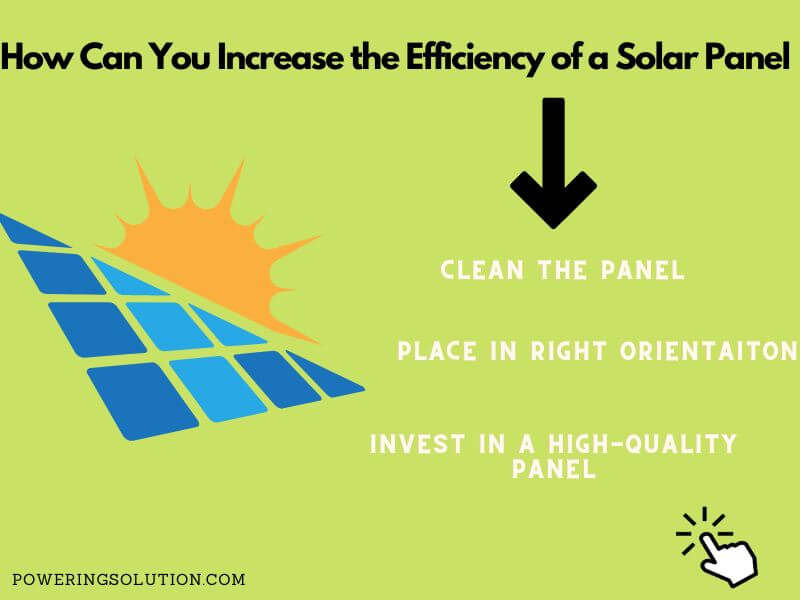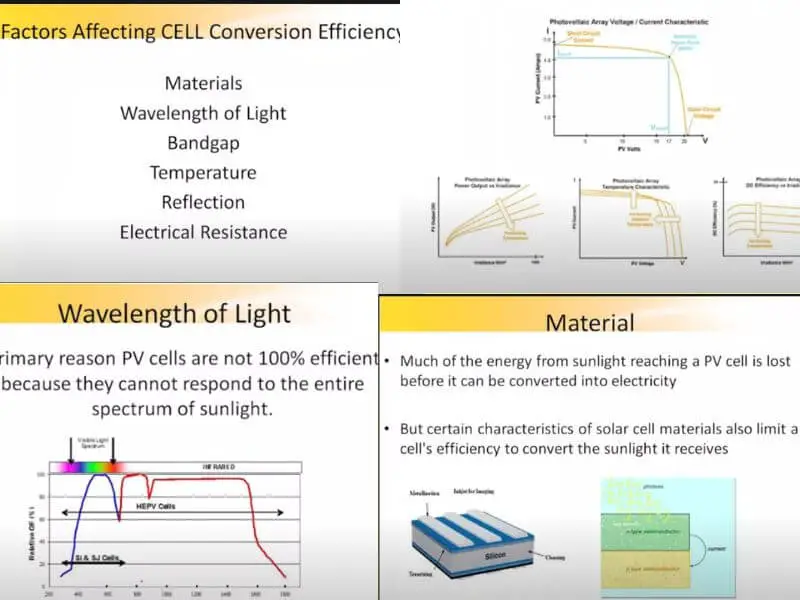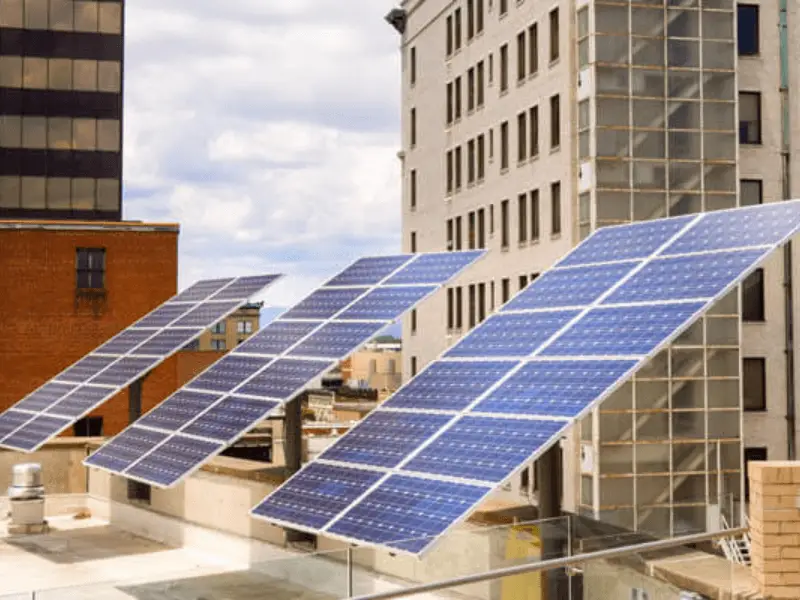As the world progresses, more and more people are looking for ways to be eco-friendly and save money. Solar panels have become a popular way to do both of these things. Solar panels rely on the sun on to produce energy, which is then used to power your home or business.

While solar panels are a great way to save money and help the environment, they can sometimes be inefficient. Here are a few ways you can increase the efficiency of your solar panel. Common solar panel issues that can decrease efficiency include debris or shading on the panels. Regularly cleaning off any dirt, leaves, or bird droppings can help maintain optimal performance. Additionally, trimming back any trees or obstructions that may cast shadows on the panels can also prevent a decrease in efficiency. Regular maintenance and monitoring of your solar panels can help address these issues and ensure they continue to operate at their highest capacity.
If you’re interested in increasing the efficiency of your solar panel, there are a few things you can do. First, ensure the panel is clean and free of debris. Second, check the panel’s orientation to ensure it’s pointing directly at the sun. Third, invest in a high-quality panel that’s designed to be efficient. And fourth, consider adding a tracking system to your setup so that the panel always stays at the sun.
By following these tips, you can maximize the efficiency of your solar panel and get the most out of your investment.
Increasing Solar Panel Efficiency With Mirrors
Most solar panels are only about 15-20% efficient at converting sunlight into electricity. However, there is a way to increase that efficiency by using mirrors to reflect more light onto the solar panels. This can be done by either mounting mirrors on the ground around the solar panel or by using a tracking system that follows the sun and reflects its light onto the panel. So solar panel glasses are very important for the efficiency of thermal energy.
The latter option is more expensive but will result in greater efficiency. The use of mirrors can increase the amount of sunlight that hits a solar panel by up to 100%, which means that it can produce twice as much electricity. This is a great way to get more power out of your solar panels, and it’s something that everyone should consider if they want to maximize their investment in renewable energy.
How to Increase Solar Cell Efficiency?
Solar cells are devices that convert sunlight into electricity. They are made of semiconductors, which can absorb and release photons, particles of light. Photons strike a solar cell and knock electrons loose from their atoms.
This generates a flow of electricity. The more efficiently a solar cell can do this, the more electricity it produces. The percentage of sunlight measures the efficiency of a solar cell converted into electricity.
The world record for conversion efficiency is 46 percent, held by a research team at the University of New South Wales in Australia. For commercial solar panels, the best efficiencies are around 20 percent.
There are several ways to increase the efficiency of solar cells:
- Use multiple layers of semiconductor material. Using different materials, each layer can absorb different wavelengths from the sun’s spectrum and convert them into electrical currents. This technique is known as thin-film photovoltaics (PV).
- Increase the surface area exposed to sunlight. A larger surface area means more photons striking the solar cell and being converted into electricity.
Factors Affecting Solar Panel Efficiency

Solar panel efficiency measures how much of the sun’s energy that hits the panel is converted into usable electricity.
The main factors affecting solar panel efficiency are:
| The quality of the solar cells used in the panel | Solar cell quality is determined by the material used, how well it was manufactured, and it’s surface area. The more efficient the solar cell, its conversion rate will be higher. |
| The amount of sunlight that hits the panel | Sunlight intensity and angle are important because they affect how much light reaches the solar cell. |
| The angle at which sunlight hits the panel | If sunlight is diffused or hits a low angle, less light will reach the cells, and their efficiency will suffer. Temperature also affects |
| The temperature of the solar cells | Temperature also affects efficiency because heat can cause electrons to be lost from atoms, reducing their ability to conduct electricity. |
How to Increase the Efficiency of Solar Panel?
Solar panels are a great way to reduce your carbon footprint and save money on your energy bill. However, they can be quite expensive to install.
If you’re looking for ways to increase the efficiency of your solar panel system, there are a few things you can do:
| Proper installation | One way to increase your solar panels’ efficiency is to ensure they’re properly positioned. The angle of the sun changes throughout the day, so it’s important that your panels can adjust accordingly. You can install a tracking system that automatically rotates your panels to follow the sun’s path. |
| Regular cleaning | Another way to improve the efficiency of your system is by keeping it clean. Dust and dirt can build up on the surface of your panels and block sunlight from reaching the photovoltaic cells. Regular cleaning with soap and water or with a green cleaner will help keep them functioning at their best |
| Invest in high-quality accessories | Finally, you can also invest in some high-quality solar panel accessories that will help increase the amount of power your system produces. These include reflective film and covers that prevent heat build-up and special mounting brackets that allow you to position your panels more effectively. With a little bit of effort, you can easily boost the efficiency of your solar panel system and save even more money on your energy bills! |
What Makes Solar Panels More Efficient?
Solar panels are more efficient when placed in an area with direct sunlight. The sunlight that hits the solar panel directly affects how much electricity it produces. Solar panels must be placed in a sunny location to produce the most electricity possible.
Additionally, solar panels are more efficient when they are kept clean. Dust and dirt can build up on the surface of the solar panel and reduce its ability to absorb sunlight. Regular cleaning will help keep your solar panel operating at peak efficiency.
Solar Panel Concentrator
If you’re considering solar power for your home or business, you may be wondering about solar panel concentrators. Solar panel concentrators are devices that increase the amount of sunlight that hits a solar panel, resulting in increased electricity production.
How Do Solar Panel Concentrators Work?
Solar panel concentrators use mirrors or lenses to direct more sunlight onto a given area of a solar panel. This results in higher electricity production since more sunlight is converted into energy.
In some cases, solar panel concentrators can increase electricity production by up to 50%. There are two main solar panel concentrators:
- Parabolic troughs: Parabolic troughs are long, curved mirrors that focus sunlight onto a fluid-filled tube (usually oil). The heat from the focused sunlight heats the fluid, which is then used to produce steam that powers an electric generator.
- Fresnel lenses: Fresnel lenses are flat mirrors that focus sunlight onto a central point. The heat from the focused sunlight is used to produce steam that powers an electric generator.
There are several pros and cons to using solar panel concentrators:
| Pros | Cons |
| One pro is that they can significantly increase electricity production from a given land area, making them ideal for large-scale commercial or utility projects where space is limited. | Additionally, because they allow smaller panels to be used, they can be less expensive than traditional photovoltaic (PV) systems. |
| Additionally, many concentrating systems use tracking mechanisms that follow the sun across the sky throughout the day, resulting in even more efficiency gains. |
Solar Panel Efficiency Over Time
Solar panel efficiency has been increasing rapidly since the early days of solar energy. In fact, according to the National Renewable Energy Laboratory (NREL), the average efficiency of commercially-available solar panels has more than doubled in the last 20 years, from about 10% in 1995 to over 21% today. And there are signs that this trend is continuing, with several companies now offering panels with efficiencies exceeding 25%.
But What Does this Mean for the Long-Term Performance?
The answer, it seems, is both yes and no. On the one hand, there are physical limits to how much sunlight can be converted into electricity, and so we are unlikely to see significant increases in efficiency beyond 30% or so. But on the other hand, there is still a lot of room for improvement in how efficient solar panels are made and used – and so it’s entirely possible that we could see further gains in efficiency over time.
In any case, even if solar panel efficiency doesn’t continue to increase at its current rate, it’s still likely to be a very good investment.
Even with today’s relatively low efficiencies, solar panels can generate a large amount of electricity over their lifetime – enough to offset their initial cost many times over.
Future of Solar Energy

The future of solar energy is looking very bright. With the cost of solar panels falling and the efficiency of solar cells increasing, it’s only a matter of time before solar becomes the dominant form of energy generation. In the past, one of the main barriers to widespread adoption of solar has been its high cost.
But as technology improves and mass production techniques are employed, those costs are coming down rapidly. In fact, they’ve fallen by more than 90% since 2010, making solar one of the fastest-growing industries in the world. As costs continue to fall and efficiency improvements continue to be made, it’s likely that solar will eventually become the primary source of energy for both homes and businesses.
And with battery technology also improving, we could see a future where renewable resources like sun and wind power our entire energy system.
What are the Main Ways to Increase the Efficiency of a Solar Panel?
The three main ways to increase the efficiency of a solar panel are by using photovoltaic cells, reflectors, and lenses. Solar panels work by converting sunlight into electricity. The more efficiently a solar panel can convert sunlight into electricity, the more power it can generate.
Photovoltaic Cell
Photovoltaic cells are the primary component of a solar panel that converts sunlight into electricity. They are made from materials that allow them to absorb photons from sunlight and release electrons. The more photons a photovoltaic cell absorbs, the more electrons it can release and the more electricity it can generate.
Reflectors
Reflectors can be used to direct more sunlight onto photovoltaic cells, increasing the amount of light they receive and allowing them to generate more electricity.
Lenses
Lenses can be used to focus sunlight onto photovoltaic cells, increasing the amount of light they receive and allowing them to generate even more electricity.
Solar panels can be made much more efficient at converting sunlight into electricity by using these three methods – photovoltaic cells, reflectors, and lenses. With higher efficiency levels, solar panels can generate greater amounts of power, making them an increasingly viable option for generating renewable energy.
How Do Solar Panel Efficiency And Power Output Work Together?
Solar panel efficiency is a measure of how much of the sun’s energy that hits the panel is converted into electricity. The power output of a solar panel is a measure of how much electricity the panel produces. Solar panel efficiency and power output are related but not directly proportional.
For Example
A solar panel with an efficiency of 10% will produce twice as much power as a 5% efficient solar panel when both are exposed to the same amount of sunlight. However, increasing the efficiency of a solar panel does not always result in increased power output. This is because there are other factors that affect power output, such as the size of the solar panel.
The most important thing to remember is that increasing either solar panel efficiency or power output will increase the amount of electricity that your system produces. If you want to maximize your investment in solar energy, it’s important to understand how these two factors work together.
Why is It Important to Keep Your Solar Panels Clean?
Solar panels are constantly bombarded with dust, pollen, bird droppings, and other types of debris. While a little bit of dirt isn’t going to hurt your solar panels, too much can actually reduce their efficiency by up to 30%. That’s why it’s important to keep them clean and free of debris.
There are a few different ways you can clean your solar panels:
| Self-cleaning | You can either do it yourself or hire a professional company to do it for you. If you decide to do it yourself, make sure you use the proper cleaning solution and follow all safety precautions. |
| Professional cleaning | Hiring a professional company is often the best option because they have the experience and equipment needed to get the job done right. |
No matter how you choose to clean your solar panels, just remember that keeping them clean will help ensure they continue to work efficiently for years to come.
What are Some Other Factors That Affect Solar Panel Efficiency?
Solar panel efficiency is determined by a number of factors, including :
- The type of solar cell,
- The materials used in the solar cell,
- The surface area of the solar cell,
- And the angle at which the solar cell is positioned.
| The type of solar cell | The type of solar cell plays a significant role in determining its efficiency. The most common type of solar cell is made from crystalline silicon. This type of solar cell has an efficiency range of 15-22%. However, there are other types of solar cells that can be made from materials such as gallium arsenide or cadmium telluride. These types of solar cells have efficiencies that range from 20-40%. |
| The materials used in the solar cell | In general, more efficient solar cells will cost more to manufacture. The materials used in solar cell construction also affect its efficiency. For example, using lower-quality silicon will result in a less efficient solar cell. |
| The surface area of the solar cell | Finally, using anti-reflective coatings on the solar cell’s surface can help increase light absorption and improve efficiency. Solar panel efficiency is also affected by its size and shape. |
| The angle at which the solar cell is positioned | Solar cells with larger surface areas can absorb more light and, thus, more efficiently. Changes in shape can also affect a Solar Panel’s ability to capture sunlight efficiently. For example, parabolic troughs focus sunlight onto a smaller area, resulting in higher energy concentrations, leading to improved efficiencies. So always look for proper orientation before installing your solar panel. |
However, these concentrating systems require tracking mechanisms that follow the sun throughout the day – increasing both initial costs as well as maintenance requirements.
Top 5 Methods to Increase Efficiency of a Solar Collector
End Note
Solar panels are a great way to increase the efficiency of your home or office. By collecting energy from the sun and converting it into electricity, solar panels can help you save money on your energy bills.
Read more:
